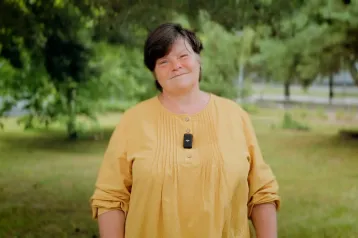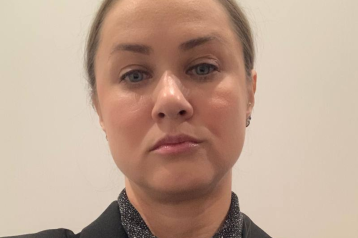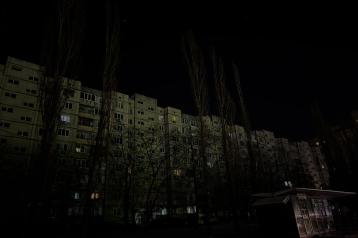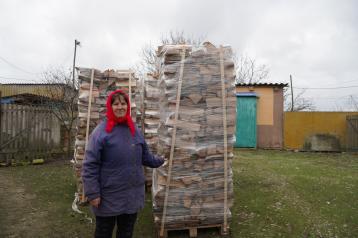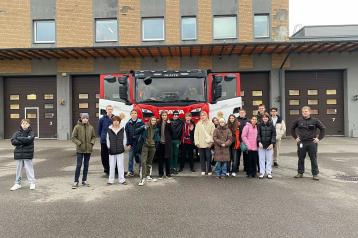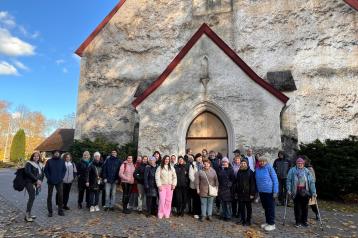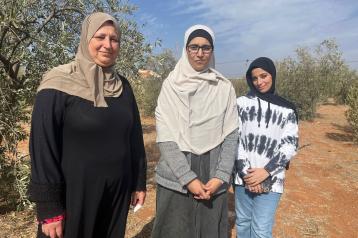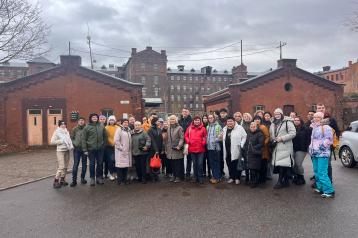Countries
- We have provided multi-purpose cash assistance to over 289,000 people in Ukraine, amounting to nearly 53 million euros.
- We launched an emergency livelihoods programme for Ukrainian refugees in Georgia. The programme is now open for applications.
- We opened the portrait exhibition “Voices from Crises: Stories of Displaced People” in Pärnu.
- In June, we raised more than 4300 euros in donations. Thank you!
Ukraine
We provide cash-based assistance, which allows people affected by war to purchase food, medicines, hygiene products, and other essentials. As of now, we have provided cash-based assistance to over 289 000 people, totaling around 53 million euros. Cash assistance is provided for three months, with support of 3600 Ukrainian hryvnias per household member per month, equivalent to about 80 euros. Registration for assistance is carried out through Estonian Refugee Council's local registration points or via the online application platform. Currently, our focus is on assisting those in need in frontline areas in Zaporizhzhia, Donetsk, Luhansk, Kharkiv, and Kherson oblasts.The programme is funded by the European Union, the USAID's Bureau for Humanitarian Assistance (BHA), the United Nations Office for the Coordination of Humanitarian Affairs (OCHA) through the Ukraine Humanitarian Fund (UHF), and the Estonian Ministry of Foreign Affairs. Acted is the implementing partner for EU and BHA projects.
We offer vulnerable women the opportunity to participate in entrepreneurship programmes and create or develop sustainable and crisis-resilient micro-businesses. In July, 11 women who participated in the programme received in-kind support for the development of their businesses, with a total value exceeding 58,000 euros. In 2024, our focus has been on supporting women in the Cherkasy, Kirovohrad, and Poltava regions.The entrepreneurship programme is supported by USAID/BHA and implemented in partnership with Acted and Garage48.
In July, we supported 128 people in the Cherkasy, Kirovohrad, and Poltava regions through our emergency livelihoods programme, with a total amount exceeding 30,000 euros. The grants help people to initiate or sustain economic activities, thereby improving their self-sufficiency. We support activities related to agriculture, livestock farming, food production, and various other services in rural areas through this programme. The grants amount up to 36,000 Ukrainian hryvnias, or approximately 800 euros.The programme is supported by the European Union, USAID/BHA, and implemented in cooperation with Acted Ukraine.
We are part of the Joint Market Monitoring Initiative (JMMI), through which we assist the humanitarian community in maintaining a consistent overview of market conditions and the price levels of essential goods in Ukraine. Through JMMI, we can better prepare our cash-based assistance programs and direct them to the areas where help is most needed. Our data collection scope covers Zaporizhzhia, Kherson, and Donetsk oblasts.
Estonia
We are running the "Edge Up" employability programme, aimed at people with a refugee background who wish to enter the job market or move on to a more suitable position. So far, two groups have completed the programme, with a third set to start at the end of August. Each month, 10-12 people participate in the training. Registration for the programme is now open. The employability programme is funded by the Interreg Baltic Sea Region Programme, with support from the European Regional Development Fund.
We conduct monthly adaptation support training sessions on various subjects, including healthcare and social systems, adaptation for parents and pensioners, education system, entrepreneurship, legal issues in the context of Estonia and Ukraine, the labour market, and digital skills. The training sessions take place across Estonia, both in face-to-face and online formats, and have been attended by over 6500 refugees so far.
We provide counselling by appointment at the Estonian Refugee Council office (Vambola 6, Tallinn) every day from 10 am to 5 pm. Our information hotline is open to all refugees, as well as institutions and individuals assisting them, at +372 5881 1311 (Monday to Friday from 10 am to 5 pm), and via email at counselling@pagulasabi.ee. Additionally, counselling services are available on Viber, WhatsApp, and Telegram at +372 5464 0007.
We help refugees who have suddenly lost their housing in finding emergency shelter.
We offer support person service to all beneficiaries of international protection and their family members in Estonia. Our support persons are assigned to those in need by local municipalities.
The support person service is funded by the European Union's Asylum, Migration and Integration Fund (AMIF) and the Ministry of the Interior.
We organise regular group activities and community events across Estonia. This year, nearly 2000 people have participated in our community activities.
We organised a youth camp at Topu puhkemaja for young people aged 13–17 with a refugee background.
We launched the Estonian Refugee Forum, an informal representative body for the beneficiaries of international protection, aimed at supporting people with refugee backgrounds in representing their communities and collectively addressing their concerns. The application period has now ended, and over the summer participants will undergo a training programme to start working together in the autumn. The Community programme activities are supported by UNHCR, the UN Refugee Agency.
We continued with interviews to identify the needs and concerns of people with refugee backgrounds in Estonia.
We offer the MindSpring programme for refugees across Estonia, focusing on mental health. The first groups began in March 2023, and to date, over 31 groups have been established. A total of 250 people have participated in MindSpring groups all over Estonia.
In collaboration with the Pärnu City Government, we opened the portrait exhibition "Voices from the Crises: Stories of Displaced People" in Vallikääru Park, Pärnu, showcasing the stories of refugees living in Estonia.
We participated in the Opinion festival held in Paide on 9–10 August, where we discussed the topic “Do local authorities fear refugees?” with the UNHCR. The discussion was led by Olga Sõtnik from UNHCR and Sigrid Solnik from the Estonian Refugee Council. Additionally, Eero Janson, the Director of the Estonian Refugee Council, took part in the panel on "Border Control and Refugee Entry: Who Do We Let In?" and the panel on "Continued Support for Ukraine: What's Next?".
Georgia
In Georgia this year, we continue with Community Councils to empower civil society and amplify the voices of refugees and internally displaced persons. The programme is implemented in collaboration with the local organisation Mtskheta-Mtianeti Regional Hub. In July, the council held an online meeting to plan ahead for their next physical gathering. The next meetings will take place on August 3-4, where each council will elect its chairman. The Community Councils programme in Georgia is supported by ESTDEV - the Estonian International Development Cooperation Centre.
We are excited to announce the launch of our emergency livelihoods programme in Georgia. Through this programme aimed at Ukrainian refugees, we support long-term self-reliance by helping people start or continue home-based small businesses. Applications are open until August. The programme is supported by the Estonian Ministry of Foreign Affairs.
Armenia
We are preparing Community Councils and a long-term livelihoods support programme in Armenia to provide a platform for displaced people from Nagorno-Karabakh to represent their views and support their self-sufficiency.
Jordan
In Jordan, our focus is on vulnerable female-led households. We are preparing for the next phase of the programme, where we will develop our training centre and provide trainings for 40 women, with support for 12 to establish hydroponic greenhouses on their own land. The greenhouses enable women to grow food for their own families or enhance their income by selling produce. Additionally, we will conduct hydroponics training for four female-led community organisations to increase knowledge of water-efficient agricultural methods in the entire region. The activities of the Estonian Refugee Council in Jordan are supported by ESTDEV – Estonian Centre for International Development.
